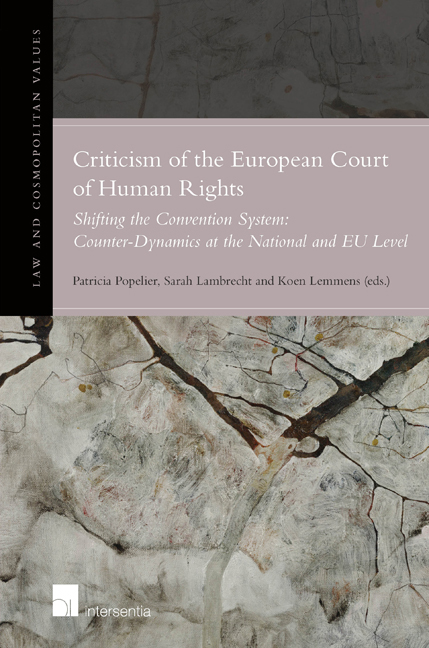 Criticism of the European Court of Human Rights
Criticism of the European Court of Human Rights Chapter 19 - Assessing the Existence of Criticism of the European Court of Human Rights
from PART VI - SYNTHESIS
Published online by Cambridge University Press: 13 December 2017
Summary
INTRODUCTION: STATUS OF THE ECHR
This book explores the existence of criticism of the European Court of Human Rights and to what extent such criticism has been translated in counterdynamics at the political or judicial level in fifteen national legal orders and the European Union. As shown in the introductory chapter, the positions towards the European Court of Human Rights are complex and nuanced. Drawing overarching generalisations is therefore not appropriate. Nonetheless, some distinct divergences and convergences in attitudes can be detected, which are explored in this concluding chapter. As an introduction, the varying status of the ECHR in the national legal orders is framed, before analysing the positions at the political and judicial level towards the Convention system.
The ECHR is currently incorporated in all the countries examined in this volume. Most of the covered countries follow a monist system (Austria, Belgium, Czech Republic, France, Netherlands, Poland, Switzerland, Turkey and Russia). Even in the countries with a dualist tradition (Germany, Hungary, Italy, Norway, Sweden and the United Kingdom), the ECHR has developed a privileged status. The country reports reveal that the monist or dualist nature of a State does not determine the status of the ECHR in national law in practice. Overall, the status of the ECHR has significantly increased over time either by deliberate jurisprudential, legislative or constitutional changes.
In several monist countries, the ECHR is granted a supra-constitutional status. In both the Netherlands and Switzerland, the ECHR has been given a prominent position as a substitute to constitutional review of primary legislation, which is explicitly banned in the Constitution. Thus, in the Netherlands, international law outranks national legal rules in the hierarchy of law, including the Constitution. Every Dutch court is empowered to disapply a legal provision if it is in conflict with self-executing provisions of treaty law. Perhaps unsurprisingly, the Dutch courts seem more familiar with the rights provided for in the ECHR than those in the Dutch Constitution. In Switzerland, the Federal Supreme Court similarly ruled that in cases of conflict of domestic norms with the ECHR, the ECHR is given precedence over norms of any rank, even constitutional law. The high rank and direct applicability of the ECHR counterbalances the predominance of the legislature over the judiciary. Today, the Federal Supreme Court regularly reviews domestic norms of all levels against the ECHR.
- Type
- Chapter
- Information
- Criticism of the European Court of Human RightsShifting the Convention System: Counter-dynamics at the National and EU Level, pp. 505 - 554Publisher: IntersentiaPrint publication year: 2016
- 5
- Cited by
